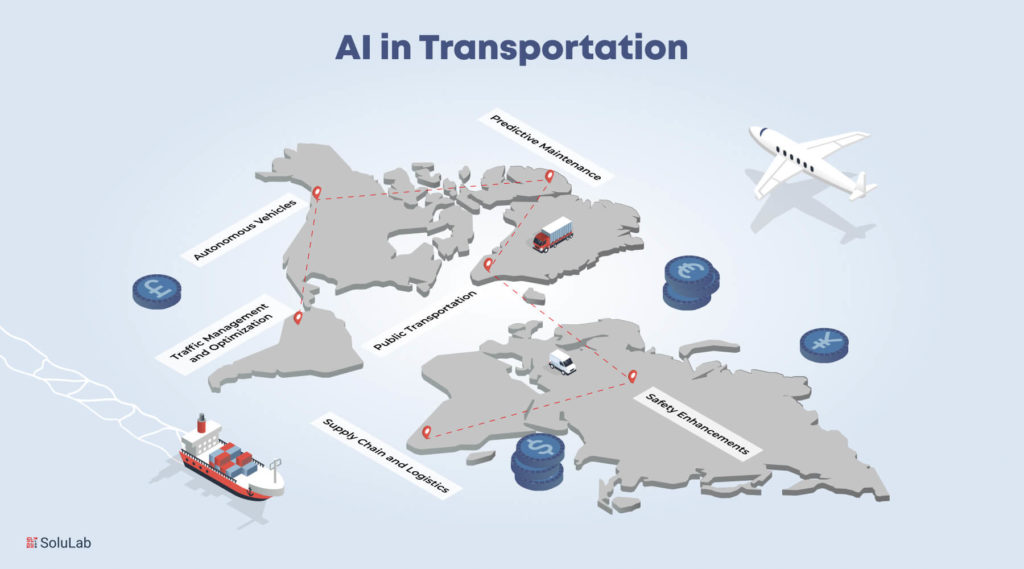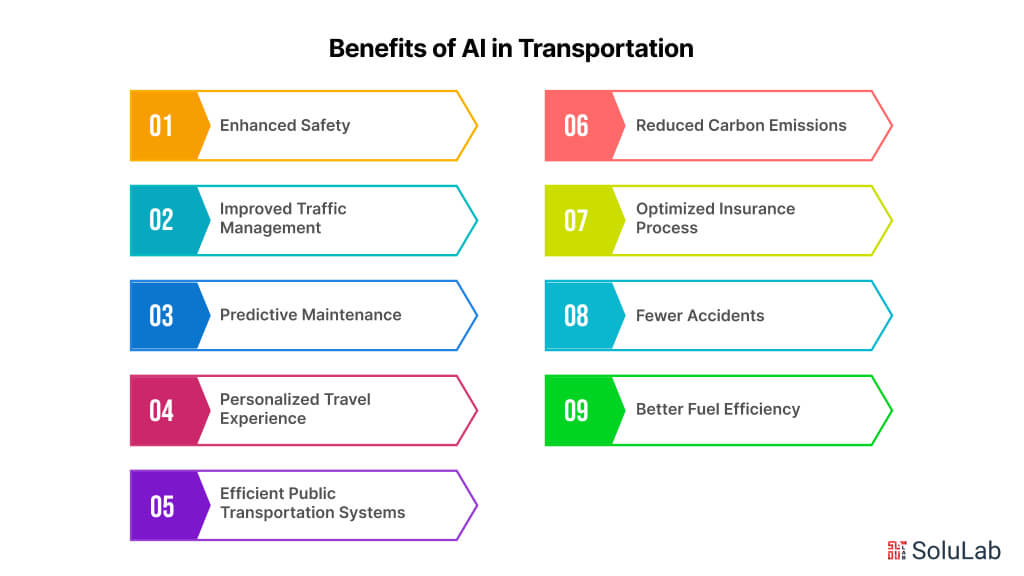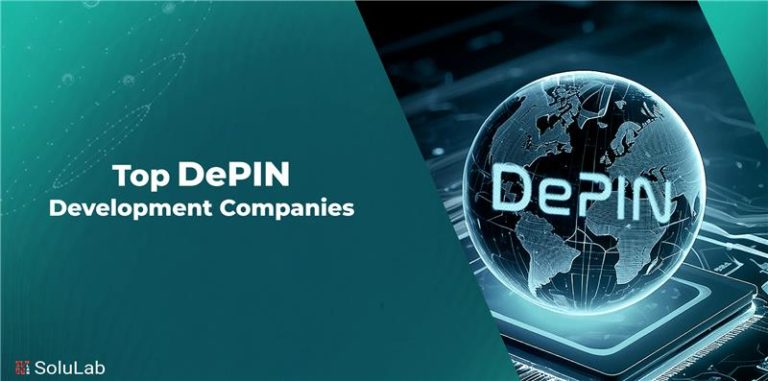
The transportation sector has undergone several investigations, evaluations, testing, and improvements to arrive at its current state. The industry has changed dramatically in recent years, starting with the advent of the steamboat in 1787 and continuing through the early 19th century with the development of bicycles, motor vehicles in the 1890s, railroads in the 19th century, and airplanes in 1903.
The state of the transportation sector today is so advanced that cars may operate on the road without the need for driver assistance at all. It is obvious that technology has contributed to its amazing path of invention and development. These days, artificial intelligence in transportation is being used to assist in making significant advancements, which is attracting the attention of global transportation executives.
As per a recent report, the global automotive AI industry was estimated to be worth $2.99 billion in 2022, and between 2023 and 2030, it is projected to grow at a compound annual growth rate (CAGR) of 25.5%.
Let us go further to grasp the numerous benefits of AI in transportation, as well as its practical use cases in the business.
How is AI Used in Transportation?
The integration of AI and transportation has revolutionized the way we travel, manage logistics, and maintain infrastructure. The advancements in transportation artificial intelligence have introduced numerous benefits, including increased safety, efficiency, and sustainability. Here are some key applications that determine the role of AI in transportation:
1. Traffic Management and Optimization
One of the primary AI applications in transportation is traffic management. Artificial intelligence (AI) systems use real-time traffic data from several sources, including GPS units, cameras, and sensors, to forecast traffic jams and improve traffic flow. This helps in reducing travel time, minimizing fuel consumption, and lowering emissions.
2. Autonomous Vehicles
Autonomous vehicles are at the forefront of artificial intelligence transportation. Self-driving cars use AI to interpret data from multiple sensors, including cameras, radar, and LIDAR, to navigate and make decisions on the road. This technology promises to reduce human error, which is a leading cause of accidents, and improve overall road safety.
3. Predictive Maintenance
Artificial intelligence in transportation engineering is also making strides in predictive maintenance. AI algorithms can predict when parts of a vehicle or transportation infrastructure are likely to fail, allowing for timely maintenance and reducing downtime. This not only enhances the reliability of transportation systems but also cuts costs associated with unexpected repairs.
4. Public Transportation
AI is improving the efficiency and user experience of public transportation systems. By analyzing patterns in passenger flow and demand, AI can optimize routes and schedules, ensuring timely and efficient service. Moreover, AI-powered apps provide real-time updates and personalized recommendations to commuters.
5. Supply Chain and Logistics
In supply chain and logistics, artificial intelligence in transportation plays a crucial role in route planning and optimization. AI-driven systems can analyze various factors, such as weather conditions, traffic patterns, and delivery windows, to determine the most efficient routes. This results in faster deliveries, reduced fuel consumption, and lower operational costs.
6. Safety Enhancements
Artificial intelligence and transportation contribute significantly to enhancing safety. AI systems can monitor driver behavior, detect signs of fatigue or distraction, and provide alerts to prevent accidents. Additionally, AI is used in the development of advanced driver-assistance systems (ADAS), which include features like automatic emergency braking, lane-keeping assist, and adaptive cruise control.
Thus, the integration of AI and transportation is driving significant advancements across various facets of the industry. From improving traffic management to enabling autonomous vehicles, artificial intelligence transportation is set to revolutionize the way we travel and transport goods, making systems safer, more efficient, and more reliable.
Benefits of AI in Transportation

The integration of Artificial Intelligence (AI) in the transportation sector is revolutionizing the way we travel and manage transport systems. By leveraging AI technologies, transportation systems can achieve higher efficiency, safety, and user satisfaction. Here are some of the key benefits of AI in transportation:
1. Enhanced Safety
AI systems can significantly improve safety in travel and transport by predicting and preventing accidents. Advanced driver-assistance systems (ADAS) use AI algorithms to detect potential hazards, such as pedestrians, other vehicles, and road obstructions, and provide real-time alerts to drivers. Moreover, AI-powered autonomous vehicles are designed to reduce human error, a leading cause of accidents.
2. Improved Traffic Management
Transportation AI is instrumental in optimizing traffic flow in urban areas. AI algorithms analyze real-time traffic data from various sources, including cameras and sensors, to predict traffic congestion and suggest alternative routes. This contributes to a better environment by cutting down on emissions and fuel usage in addition to shortening travel times.
3. Predictive Maintenance
AI in public transportation helps maintain vehicles and infrastructure by predicting maintenance needs. Machine learning models analyze data from vehicle sensors to identify patterns and predict component failures before they occur. This proactive approach reduces downtime and maintenance costs while ensuring that transportation systems operate smoothly.
4. Personalized Travel Experience
AI in travel and transport enables the creation of personalized travel experiences for passengers. AI-powered systems can recommend optimal travel routes, provide real-time updates on delays, and offer personalized suggestions based on individual preferences. For instance, AI-powered chatbots can assist passengers in booking tickets, finding accommodations, and navigating through airports or train stations.
5. Efficient Public Transportation Systems
AI can transform public transportation by optimizing routes and schedules based on passenger demand and traffic conditions. AI algorithms analyze historical and real-time data to adjust bus and train schedules dynamically, ensuring minimal wait times and efficient use of resources. This leads to increased passenger satisfaction and higher ridership.
6. Reduced Carbon Emissions
AI optimizes travel routes for fuel efficiency, reduces traffic congestion and idle times, and promotes the use of electric vehicles by optimizing charging infrastructure. These measures collectively decrease fuel consumption and emissions, contributing to a greener environment.
7. Optimized Insurance Process
AI streamlines the insurance process by accurately assessing risks, automating claims processing, and detecting fraudulent claims. This results in fairer insurance premiums, faster dispute resolutions, and a more efficient and transparent insurance system.
8. Fewer Accidents
AI reduces accidents through Advanced Driver-Assistance Systems (ADAS) and autonomous vehicles, which minimize human error and respond to hazards quickly. Predictive maintenance powered by AI also ensures vehicles are well-maintained, preventing mechanical failures that could lead to accidents.
9. Better Fuel Efficiency
AI enhances fuel efficiency by optimizing driving patterns, predicting maintenance needs, and managing fleet operations effectively. Real-time feedback to drivers, efficient route planning, and reduced idle times contribute to significant fuel savings and cost reductions for transportation companies.
Top Use Cases of AI in Transportation
The whole transportation business is changing as a result of artificial intelligence. The transportation business is experiencing exponential growth, and the use of AI technology is justified by its numerous applications, which range from improving traffic management to increasing vehicle safety.
Let’s examine the top AI use cases in transportation and see how technology is transforming the field.
-
Customer Support Chatbots
AI-driven chatbots are revolutionizing consumer-business interactions. These chatbots can comprehend and reply to client inquiries regarding automobile features, offer information, and even help with issue-solving because they are outfitted with natural language processing (NLP) capabilities.
Artificial intelligence (AI) chatbots can replace employees’ repetitive duties, such as assisting clients in choosing automobile models, arranging test drives, and collecting client feedback, freeing up human agents to address more complicated problems.
Businesses may improve customer service efficiency, shorten response times, and provide a more engaging and customized user experience by utilizing AI-driven chatbots.
-
Autonomous Vehicles
Autonomous or driverless automobiles represent one of the most revolutionary uses of AI in transportation. A few years ago, autonomous cars were only a sci-fi dream. Fortunately, they are becoming a reality. Tokyo serves as a fantastic illustration of this future, in which autonomous vehicles are effectively operated on public roads. Nonetheless, the driver must remain seated in the automobile in order to manage it in an emergency for safety reasons.
AI makes autonomous driving possible by enabling cars to sense and react to their surroundings using automotive AI and machine learning as well as sophisticated sensors. Even though this idea was met with skepticism in its early phases of research, autonomous automobiles have had a significant impact on the transportation industry.
-
Finding Insurance Fraud
Fraud is a major issue in the field of vehicle insurance. Insurance companies had to reimburse billions of dollars for fictitious claims. In the fight against insurance fraud, AI combined with NLP is essential. Artificial intelligence (AI) algorithms examine vast amounts of data to spot irregularities and uncover questionable trends of fraudulent activity.
Generative AI in Automotive Industry allows insurance companies to take proactive steps to stop fraudulent claims in real time, save money, lessen losses, and preserve the integrity of the insurance market. Insurance companies may expedite claims processing, improve accuracy, and foster policyholder trust by utilizing AI for insurance fraud detection.
Read Our Blog: The Impact of AI on the Insurance Sector
-
Driver Behavior Analytics
Transportation safety is being transformed by AI-driven analytics for driver behavior. Artificial intelligence (AI)-enabled telematics devices may track and evaluate a range of driver behavior metrics, such as speeding, abrupt braking or acceleration, fuel consumption, oil change intervals, post-accident vehicle downtime, and compliance with traffic regulations.
For insurance pricing models, fleet management, and encouraging safer driving practices, this data is priceless. AI helps to optimize insurance rates based on individual driving patterns, lower the likelihood of accidents, and improve road safety by offering insights into driver behavior.
-
Forecasts for Flight Delays
One of the most frequent issues with modern air travel is flight delays. It has a detrimental effect on travelers’ flight experiences, diminishing the value of transportation companies and raising customer attrition.
AI steps in to help solve these problems. By cutting wait times and improving the traveler experience, the transportation sector can provide great customer service by utilizing big data analytics and AI. Technology assists the aviation industry in gaining valuable insights into the various factors that may lead to flight delays and cancellations since everything from weather conditions to technical malfunctions can result in flight delays. Passengers may update their information and travel details with the organization, which will assist them avoid needless wait periods and adjust their itineraries appropriately.

-
Traffic Control
Traffic congestion is one of the main issues commuters deal with on a daily basis. AI in transportation is ready to take on this task as well. Artificial intelligence (AI) algorithms evaluate real-time data from several sources, such as GPS devices, traffic cameras, and sensors, to improve traffic flow. In order to relieve congestion and boost productivity, intelligent traffic management systems automatically modify the timing of traffic signals and redirect cars.
What’s additional? Important updates are sent to the passengers, such as potential accident scenarios, traffic forecasts, or road closures. They are also informed of the quickest path, which enables them to arrive at their destination without being caught in any traffic jams. In this method, artificial intelligence not only fixes the issue of undesired traffic but also shortens wait times and enhances traffic safety.
-
Real-Time Vehicle Tracking
Vehicle tracking systems with AI capabilities offer up-to-date information on the whereabouts, conditions, and status of a fleet. Businesses can monitor fuel economy, arrange maintenance in advance, and improve route planning by combining GPS data, sensors, and predictive analytics. This guarantees the total operating efficiency of the transportation fleet, increases delivery timeliness, lowers fuel costs, and improves fleet management.
What’s more? The data is freely accessible from any device at any time because it has been uploaded to the cloud.
-
Inventory Control
Transportation-related AI has completely transformed warehouse and inventory management. Businesses may improve the efficiency and accuracy of their reorder operations, estimate demand, and find appropriate inventory levels by utilizing AI-powered warehouse robots and machine learning algorithms. This reduces the possibility of stockouts and overstock scenarios and improves the efficiency of the supply chain as a whole, saving money and raising customer satisfaction.
AI is being used in transportation in a very impressive way since it can forecast both the short and long future. It can ensure that you have only the necessities in your storage while comparing supply to demand in the short-term estimates. In the long term, it anticipates patterns and pinpoints seasonal requirements.
-
Cautious Driver Assistance
With sophisticated systems that track traffic patterns and driver behavior, artificial intelligence (AI) is transforming driver care and safety. Modern automobiles may recognize driver behavior that may represent a traffic concern by utilizing AI in transportation, computer vision, emotion recognition, and intelligent IoT sensors. By examining variables including body temperature, weariness, tiredness, eye movement, head posture, driving behavior, and time, AI can determine whether a driver’s state poses a risk. The AI system may react by halting the car or switching to self-driving mode, among other preventative actions.
Artificial intelligence (AI) algorithms are used by advanced driving assistance systems (ADAS) to identify possible risks, notify drivers in real-time, and sometimes even initiate remedial action to avoid collisions. This reduces insurance costs and lessens the chance of accidents brought on by human mistakes in addition to improving the safety of drivers and passengers.
Real-World AI in Transporation Examples

Artificial Intelligence advances automates, and streamlines the automobile sector. For this reason, the use of AI in transportation is growing across many large corporations and even up-and-coming startups. Here are a few of the most notable real-life AI in transportation examples.
1. Tesla
Tesla uses artificial intelligence (AI) to make its range of vehicles capable of self-driving. This massive automaker employs artificial intelligence (AI) to identify driver behavior, including degrees of drowsiness and exhaustion, averting potentially dangerous collisions on the roadways.
2. BMW
Over 400 AI apps are used by BMW in all aspects of its business operations. Depending on the driver’s preferences and behavior, some of the brand’s most recent models come with AI-powered personal assistants that improve convenience and safety for drivers by carrying out a variety of activities.
3. Hitachi
The industry leader Hitachi is well known for applying AI to the transportation sector. The business is highly renowned for producing innovative software for predictive fleet maintenance. Hitachi analyzes enormous amounts of data, providing thorough fleet monitoring and guaranteeing the longevity of fleet assets by utilizing the power of IoT and AI.
4. Waymo
Waymo, a self-driving technology business that was once known as the Google self-driving vehicle project, uses artificial intelligence (AI) to enable self-driving capabilities in its fleet of delivery vans, taxis, and tractor-trailers.
5. Audi
Audi inspects the sheet metal of its vehicles using computer vision and artificial intelligence. These cutting-edge technologies enable the business to remove defective components from completed goods by identifying even the slightest fractures throughout the production process.
Future of AI in Transportation
Even if artificial intelligence (AI) has already significantly changed the transportation sector, its potential is still being realized. In the future, the innovative role that artificial intelligence (AI) will play in transportation is expected to undergo a substantial transformation, becoming more integrated into the sector and assuming progressively more complicated duties.
AI is predicted to advance to the point that it can accurately foresee future trends, bringing in a new era of proactive decision-making, going beyond automation and mistake reduction. The application of AI in transportation has the potential to completely transform how we move people and products around.
In addition to autonomous cars, AI-powered traffic control systems will maximize city mobility, lessen traffic, and boost the effectiveness of transit systems. The road ahead holds more developments in autonomous vehicle technology as well as the incorporation of AI into predictive analytics for infrastructure design, all of which promise to further explore AI’s potential to completely transform the transportation sector.
We may anticipate an increasingly developing role for AI in transportation, which will redefine the industry’s future, as technology develops.
Conclusion
The integration of artificial intelligence in transportation engineering is revolutionizing the sector, bringing unprecedented improvements in efficiency, safety, and sustainability. From smarter traffic management and reduced carbon emissions to optimized insurance processes, fewer accidents, and improved fuel efficiency, AI is paving the way for a more reliable and effective transportation system. As AI technologies continue to evolve, their impact on transportation will only grow, driving further innovations and advancements that enhance the overall travel experience for individuals and businesses alike.
However, implementing transportation artificial intelligence also presents challenges, such as data privacy concerns, high implementation costs, and the need for robust infrastructure. SoluLab, as a leading AI development company, can help overcome these challenges by providing customized AI solutions tailored to the specific needs of transportation systems. Our team of expert AI developers can design and implement advanced AI systems that address these issues, ensuring seamless integration and optimal performance. To explore how SoluLab can transform your transportation operations with AI, contact us today and hire AI developer who can turn your vision into reality.
FAQs
1. What are the primary benefits of using AI in transportation?
AI in transportation offers several benefits, including smarter traffic management, reduced carbon emissions, optimized insurance processes, fewer accidents, and improved fuel efficiency. These advancements lead to a more efficient, safer, and environmentally friendly transportation system.
2. How does AI improve traffic management?
AI enhances traffic management by analyzing real-time data from cameras, sensors, and GPS devices to predict congestion, adjust traffic signals dynamically, and suggest optimal routes. This reduces travel times, improves traffic flow, and enhances road safety through rapid incident detection and response.
3. Can AI help in reducing carbon emissions in transportation?
Yes, AI can significantly reduce carbon emissions by optimizing travel routes for fuel efficiency, minimizing traffic congestion and idle times, and promoting the use of electric vehicles through optimized charging infrastructure. These measures collectively contribute to a greener and more sustainable transportation system.
4. What challenges are associated with implementing AI in transportation?
Challenges in implementing AI in transportation include data privacy concerns, high implementation costs, and the need for robust infrastructure. Addressing these challenges requires customized AI solutions, expert development, and seamless integration into existing systems.
5. How can SoluLab help in implementing AI solutions for transportation?
SoluLab, as a leading AI development company, provides tailored AI solutions to address the unique challenges of transportation systems. Our team of expert AI developers can design and implement advanced AI systems that ensure seamless integration and optimal performance. To explore how SoluLab can transform your transportation operations with AI, contact us today and hire an AI developer who can turn your vision into reality.






